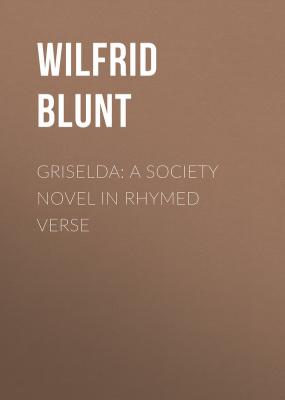Griselda: a society novel in rhymed verse. Blunt Wilfrid Scawen
Читать онлайн.| Название | Griselda: a society novel in rhymed verse |
|---|---|
| Автор произведения | Blunt Wilfrid Scawen |
| Жанр | Зарубежные стихи |
| Серия | |
| Издательство | Зарубежные стихи |
| Год выпуска | 0 |
| isbn |
An old-world wilderness of greys and browns,
Rocks, olive-gardens, grim dismantled towns,
Deep-streeted, desolate, yet dear to see,
Smelling of oil and of the Papacy.
Griselda first gave reins to her romance
In this forgotten corner of old France,
Feeding her soul on that ethereal food,
The manna of days spent in solitude.
Lord L. was silent. She, as far away
Saw other worlds which were not of to-day,
With cardinals, popes, Petrarch and the Muse.
She stopped to weep with Laura at Vaucluse,
Where waiting in the Mistral poor Lord L.,
Who did not weep, sat, slept and caught a chill;
This sent them southwards on through Christendom,
To Genoa, Florence, and at last to Rome,
Where they remained the winter.
Change had wrought
A cure already in Griselda's thought,
Or half a cure. The world in truth is wide,
If we but pace it out from side to side,
And our worst miseries thus the smaller come.
Griselda was ashamed to grieve in Rome,
Among the buried griefs of centuries,
Her own sweet soul's too pitiful disease.
She found amid that dust of human hopes
An incantation for all horoscopes,
A better patience in that wreck of Time:
Her secret woes seemed chastened and sublime
There in the amphitheatre of woe.
She suffered with the martyrs. These would know,
Who offered their chaste lives and virgin blood,
How mortal frailty best might be subdued.
She saw the incense of her sorrow rise
With theirs as an accepted sacrifice
Before the face of the Eternal God
Of that Eternal City, and she trod
The very stones which seemed their griefs to sound
Beneath her steps, as consecrated ground.
In face of such a suffering hers must be
A drop, a tear in the unbounded sea
Which girds our lives. Rome was the home of grief,
Where all might bring their pain and find relief,
The temple of all sorrows: surely yet,
Sorrow's self here seemed swallowed up in it.
'Twas thus she comforted her soul. And then,
She had found a friend, a phœnix among men,
Which made it easier to compound with life,
Easier to be a woman and a wife.
This was Prince Belgirate. He of all
The noble band to whose high fortune fall
The name and title proudest upon earth
While pride shall live by privilege of birth,
The name of Roman, shone conspicuous
The head and front of his illustrious house,
Which had produced two pontiffs and a saint
Before the world had heard of Charles le Quint;
A most accomplished nobleman in truth,
And wise beyond the manner of his youth,
With wit and art and learning, and that sense
Of policy which still is most intense
Among the fertile brains of Italy,
A craft inherited from days gone by.
As scholar he was known the pupil apt
Of Mezzofanti, in whose learning lapped
And prized and tutored as a wondrous child,
He had sucked the milk of knowledge undefiled
While yet a boy, and brilliantly anon
Had pushed his reputation thus begun
Through half a score of tongues. In art his place
Was as chief patron of the rising race,
Which dreamed new conquests on the glorious womb
Of ancient beauty laid asleep in Rome.
The glories of the past he fain would see
Wrought to new life in this new century,
By that continuous instinct of her sons,
Which had survived Goths, Vandals, Lombards, Huns,
To burst upon a wondering world again
With full effulgence in the Julian reign.
In politics, though prudently withdrawn
From the public service, which he held in scorn,
As being unworthy the deliberate zeal
Of one with head to think or heart to feel;
And being neither priest, nor soldier, nor
Versed in the practice of Canonic lore,
He made his counsels felt and privately
Lent his best influence to "the Powers that be," —
Counsels the better valued that he stood
Alone among the youth of stirring blood,
And bowed not to that Baal his proud knee,
The national false goddess, Italy.
He was too stubborn in his Roman pride
To trick out this young strumpet as a bride,
And held in classic scorn who would become
Less than a Roman citizen in Rome.
A man of heart besides and that light wit
Which leavens all, even pedantry's conceit.
None better knew than he the art to shew
A little less in talk than all he knew.
His manner too, and voice, and countenance,
Imposed on all, and these he knew to enhance
By certain freedoms and simplicities
Of language, which set all his world at ease.
A very peer and prince and paragon,
Griselda thought, Rome's latest, worthiest son,
An intellectual phœnix.
On her night
A sudden dawn had broke, portentous, bright.
Her soul had found its fellow. From the day
Конец ознакомительного фрагмента.
Текст предоставлен ООО «ЛитРес».
Прочитайте эту книгу целиком, купив полную легальную версию на ЛитРес.
Безопасно оплатить
